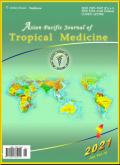中国大陆成年登革热患者血清白蛋白水平与疾病严重程度的相关性:一项7年回顾性队列研究
IF 1.6
4区 医学
Q3 PUBLIC, ENVIRONMENTAL & OCCUPATIONAL HEALTH
引用次数: 1
摘要
目的:了解中国大陆成年登革热患者血清白蛋白水平与疾病严重程度的关系。方法:本回顾性队列研究分析了2013年至2019年中国大陆三级传染病中心因实验室确诊登革热住院的成年患者(年龄≥18岁)的数据。对严重登革热和非严重登革热患者的血清白蛋白水平进行了评估和比较。此外,使用广义线性模型[相对风险(RR)]评估血清白蛋白水平与严重登革热之间的相关性。进行多变量逻辑回归分析,以确定严重登革热的潜在预测因素。结果:本研究共纳入1568例患者。在这些患者中,34人(2.17%)出现严重登革热。严重登革热患者的血清白蛋白水平中位数显著低于非严重登革热患者(33 g/L vs.37 g/L,P<0.001)。在校正年龄、性别和合并症后,发现低白蛋白血症(RR 4.877,95%CI 2.193-11.461,P<001)是严重登革的预测因素。血清白蛋白水平(OR 1.303,95%CI 1.161-1.462,P<0.001)和年龄(OR 1.038,95%CI 1.017-1.061,P<001)是严重登革热的重要危险因素。血清白蛋白水平用于区分严重登革热的曲线下面积为0.787。结论:成年登革热患者血清白蛋白水平较低与疾病严重程度显著相关。入院时的低白蛋白血症导致严重登革热的风险增加至少四倍。本文章由计算机程序翻译,如有差异,请以英文原文为准。
Association between serum albumin levels and disease severity in adult patients with dengue: A 7-year retrospective cohort study in mainland China
Objective: To identify the association between serum albumin levels and disease severity among adult patients with dengue in mainland China. Methods: This retrospective cohort study analyzed the data of adult patients (aged ≥ 18 years) hospitalized with laboratory-confirmed dengue in a tertiary center for infectious diseases from 2013 to 2019 in mainland China. Serum albumin levels were estimated and compared between patients with severe dengue and non-severe dengue. Additionally, the association between serum albumin levels and severe dengue was evaluated using a generalized linear model [relative risks (RR)]. Multivariate logistic regression analysis was performed to identify the potential predictors of severe dengue. Results: Overall, 1568 patients were included in this study. Of these patients, 34 (2.17%) developed severe dengue. The median serum albumin levels were significantly lower in patients with severe dengue than that in those with non-severe dengue (33 g/L vs. 37 g/L, P<0.001). After adjustment for age, sex, and comorbidities, hypoalbuminemia (RR 4.877, 95% CI 2.193-11.461, P<0.001) was found to be a predictor of severe dengue. Serum albumin levels (OR 1.303, 95% CI 1.161-1.462, P<0.001)] and age (OR 1.038, 95% CI 1.017-1.061, P<0.001) were significant risk factors for severe dengue. The area under the curve for serum albumin levels to distinguish severe dengue was 0.787. Conclusions: Lower serum albumin levels were significantly associated with disease severity in adult patients with dengue. Hypoalbuminemia on admission resulted in at least a four-fold increased risk of severe dengue.
求助全文
通过发布文献求助,成功后即可免费获取论文全文。
去求助
来源期刊

Asian Pacific journal of tropical medicine
PUBLIC, ENVIRONMENTAL & OCCUPATIONAL HEALTH-TROPICAL MEDICINE
CiteScore
4.00
自引率
9.70%
发文量
1936
审稿时长
3-8 weeks
期刊介绍:
Asian Pacific Journal of Tropical Medicine (ISSN 1995-7645 CODEN: APJTB6), a publication of Editorial office of Hainan Medical University,is a peer-reviewed print + online Monthly journal. The journal''s full text is available online at http://www.apjtm.org/. The journal allows free access (Open Access) to its contents and permits authors to self-archive final accepted version of the articles on any OAI-compliant institutional / subject-based repository.
APJTM aims to provide an academic communicating platform for international physicians, medical scientists, allied health scientists and public health workers, especially those of the Asia-Pacific region and worldwide on tropical medicine, infectious diseases and public health, and to meet the growing challenges of understanding, preventing and controlling the dramatic global emergence and re-emergence of infectious diseases in the Asia-Pacific.
The journal is proud to have an international and diverse editorial board that will assist and facilitate the publication of articles that reflect a global view on tropical medicine, infectious diseases and public health, as well as emphasizing our focus on supporting the needs of public health practitioners. The APJTM will allow us to seek opportunities to work with others who share our aim, and to enhance our work through partnership, and to uphold the standards of our profession and contribute to its advancement.
 求助内容:
求助内容: 应助结果提醒方式:
应助结果提醒方式:


